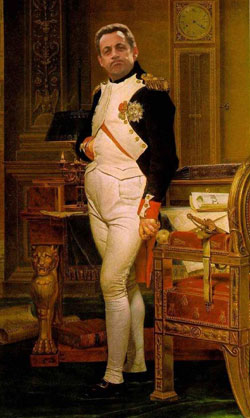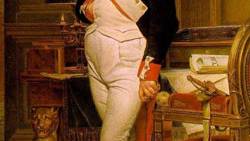Leading author claims Sarkozy is 'Napoleon in a suit'
Source: sundayherald.com
 They are two small men in a hurry, who at the start of a new century both believe it is their destiny to drag France out of chaos and decline.
They are two small men in a hurry, who at the start of a new century both believe it is their destiny to drag France out of chaos and decline.Both are outsiders who despise the Paris elite. (Ed Comment: "Outsider" can be debated, see Thierry Meyssan's article: Operation Sarkozy for his elite background.)They are control freaks who must interfere in every corner of government. They are obsessed by image and see the media as a vital tool of power. One way or another, they both dream of taking the reins of Europe.
Each likes ostentation and has a frank respect for money. They also adore women - though their dependence on beautiful consorts exposes a disarming psychological frailty.
The two men are hated and admired in equal measure. Some believe them to be providential heroes and overlook their flaws as the inevitable side-effects of reforming genius.
But others see them as anti- democrats whose legacy is the undoing of freedom. For their many enemies, whatever positive change the two leaders bring is vastly outweighed by a worrying personalisation of political power.
Comparisons have been made before between Napoleon Bonaparte and Nicolas Sarkozy, his 26th successor as French head of state. Now, thanks to one of the country's leading political commentators, the comparisons have taken a step closer to becoming an accepted truth.
In his book, La Marche Consulaire (The Consular March), out this week, Alain Duhamel sets out the case for regarding Sarkozy as a 21st-century incarnation of the most influential Frenchman of modern times - or, as he puts it: "Bonaparte in a suit."
"Both men intend to leave behind them a France which is no longer what it was. They see themselves as the rescuers of a great but weakened nation," Duhamel writes. "It is up to them - each thinks - to restore confidence, impose order, but above all to modernise, reform and innovate."
For Duhamel - a columnist for the left-wing daily Liberation - the point of similarity is with the Corsican general who took over as first consul in 1800 before embarking on a vast programme of domestic reforms, rather than with the "brutal, irresistible, glorious" emperor who was crowned four years later and went on to conquer much of Europe.
In the late 18th and early 19th century, France was mired in post-revolutionary instability. Just like recent times, it was wracked by "crisis, anxiety and disenchantment". In both instances, the country was in search of a "new social model and a new political power bringing together authority and innovation".
"France realises it has to transform itself but it wants to do it without new shocks or convulsions. It wants movement, but with order. And so it demands (from its leader) initiative, ascendancy but also compassion for an ambitious but anxious people," Duhamel writes.
But if Sarkozy and Bonaparte offer the same sense of promise for a beleaguered nation, they also share temperamental defects that make their manner of government idiosyncratic, exasperating and ultimately - for their critics - dangerous.
"Both are hot-tempered, impatient and nervous. They both throw memorable fits of anger, sometimes semi-affected. They are incapable of standing still, they think while they walk, wolf their meals, take decisions even as they speak.
"They are exhausting for their entourages, and often for themselves. They hate it when people oppose them, but they despise yes-men and conformists Their ambition is immense," Duhamel writes.
During Sarkozy's 20 months in office, the Bonapartist urge to "advance on every front" has translated into an almost endless series of personally inspired initiatives, often taken over the heads of his own ministers, who watch powerless from the sidelines.
Only last week Sarkozy unexpectedly announced plans for a fundamental change to the legal system, abolishing the all-powerful figure of the "examining magistrate" (ironically created by Bonaparte). As with so many of Sarkozy's reforms, it was capable of two interpretations: either a courageous modernisation, or an autocrat's wanton whim.
Another controversial reform currently going through parliament - addressing state-run television - invites comparisons with Bonaparte's obsession with image-control.
Just as the Corsican funded newspapers and inundated opinion-formers with self-aggrandising propaganda, so the president is accused of trying to muzzle the modern-day media. "Both set the highest store by the public presentation of their action," says Duhamel.
Both men are also adept at co-opting potential opponents, using a combination of flattery and political favours. Bonaparte succeeded in neutralising the anti-revolutionary monarchists; Sarkozy has done much the same with the Socialists - offering several leading lights a position in government.
Most intriguing of all is the two men's relationship with women. Bonaparte was famously obsessed with Josephine, but they quarrelled and the couple divorced after he came to power. Sarkozy went through a similar pattern with his first wife Cecilia.
However, there the similarity ends because where Bonaparte went on to marry an Austrian archduchess - dumpy but good for breeding - Sarkozy has found a new female totem in the form of a certain Carla Bruni.
Article from: Leading author claims Sarkozy is 'Napoleon in a suit'






















